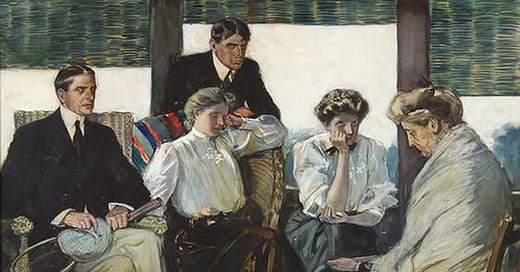I'm delighted to have this story featured in Vol. 8, Issue 18 of Top in Fiction on Substack!
Hugh explained it afterwards by saying that, failing access to castles and dungeons, really the best place to hide a president is in plain sight. If Washington has any dungeons, a reputable but modest old law firm that mostly handles wills and trusts doesn’t have access to them; so when Timothy Kelleher walked into the offices of Makepeace and Caulfield on a Friday morning and informed them that he had the deposed president of Macamia, the president’s wife, daughter, and two secretaries on his yacht in the Potomac, and required a safe place to deposit them temporarily, the firm found itself in a unique situation.
Makepeace and Caulfield had always rather regretted the Kelleher connection, even though the family had been old and valued clients. The firm saw relatively little of Tim Kelleher, who spent most of his time racketing around the world on his yacht engaged in stimulating and highly unofficial activities, but on the occasions he did drop in requiring legal services it was always for something unorthodox. This wasn’t the first time he had been mixed up in a South American revolution, but he was right in at the top of this one, on the side of the Government this time. When the capitol city fell to the rebels, he had managed to smuggle off the President and his suite in his yacht without anyone knowing how they had left the country. The United States was favorable to the old Government, and might be persuaded to help restore it given certain concessions (chiefly regarding the export of bananas), but it wasn’t about to send out gunboats to collect the fugitive President on a mere speculative chance. He would have to make it to Washington to establish diplomatic relations himself—alive and in one piece.
The Congressman of Tim Kelleher’s acquaintance who could arrange a meeting with the proper person at the State Department was out of town till Monday, Tim explained, and so he merely had to find a place to keep the Presidential party ashore till then—the yacht, he said, would attract too much attention once it got around that he had come from Macamia. Naturally he had come to his old family lawyers as the most trustworthy parties he knew for help with the matter. Naturally.
The firm made a very slight attempt to protest that hiding South American presidents was not in their usual line of business, but to little avail—one could not convey those types of things to Tim Kelleher. Surely a good lawyer knew some discreet place where five people could stay for two days. Surely.
Keep reading with a 7-day free trial
Subscribe to The Second Sentence to keep reading this post and get 7 days of free access to the full post archives.






